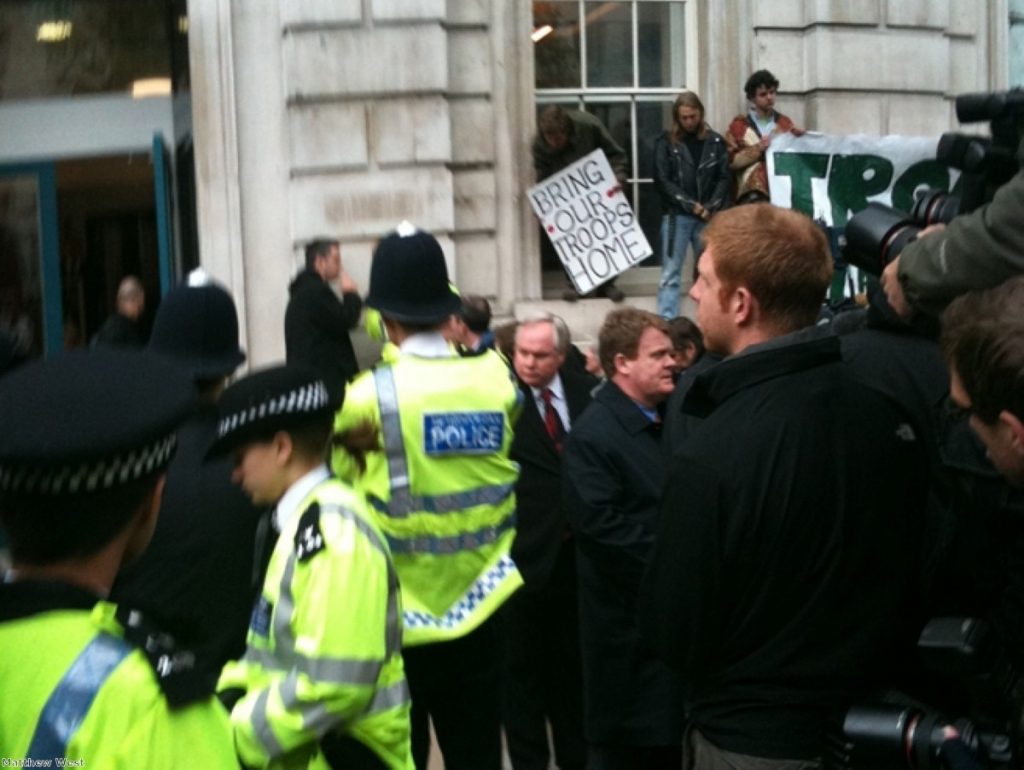Sketch: A country divided?
Packs of journalists and protestors turned Westminster into a minor war zone today, as the people of London made their views on a hung parliament known.
By Matthew West
Nothing sums up the febrile temper of the nation as the scenes in Whitehall this evening. The crowds began to gather early. Journalists, photographers, camera crews all lurked around the entrance to the Cabinet Office from around 14:00 BST, as many realised that the negotiations between Labour and the Liberal Democrats had collapsed and the Lib Dem team was now going back to the negotiating table with the Conservatives.
Then there was the crowd hanging around the entrance to Downing Street, not an especially unusual event in itself but this crowd was gathered for one thing this time: to see if Gordon Brown would be leaving any time soon.


It took several hours. The protestors busied themselves with chants calling for fair votes or troops to get out of Afghanistan. One particular gem was: “Could the politicians come out so we can heckle you please.” For the most part it was genial and light-hearted.
Things got a little more fraught though around 18:00 BST. It all happened then. For starters the police were required to remove the protestors. That took some time. Many of them didn’t want to go and many of them put up a bit of a fight. But the politicians weren’t going to come out and be heckled by the public they were sworn to serve.
Then at 19:00 BST Gordon Brown came out of Number 10 and announced his resignation as prime minister. He entered his car and left the crowds who had waited to see this history in the making. Some clapped as the prime minister’s car left Downing Street for Buckingham Palace but many more booed.
Then there was a mad dash the hundred yards or so back to the Cabinet Office to await the two negotiating teams of the Lib Dems and Conservatives.
The Lib Dem team came out first. Danny Alexander the lead negotiator said little and looked glum. David Laws stared straight ahead of him focusing at nothing in particular. He looked far from happy but the honest answer was that none of us had any idea what was going on still.
One anti-war protestor jumped out from behind the Lib Dem team as they left but was pounced on instantly by police. The Lib Dem team managed to slip through the crowd of photographers without harm.
Then the Conservative team came out of the Cabinet Office. William Hague looked statesmanlike but said nothing of importance before striding away. The Conservative shadow foreign secretary and his team were met with boos and jeers. There were few cheers among the waiting crowd.
This time a police escort was necessary They didn’t take a light touch approach to clearing people out of their way. William Hague, George Osborne and Oliver Lettwin strode up Whitehall to Derby Gate chased by camera crews and protestors in equally number. Traffic was brought to a halt as the Conservative negotiating team walked up Whitehall. George Osborne couldn’t resist one of this trademark smirks.
As the Conservative team rounded the corner at the Red Lion pub into Derby Gate and the bowels of Portcullis House they were met by boos and jeers from one side of the road. Then some realised that their team were getting jeered so starting clapping and cheering to drown out the noise.
That there is unhappiness, real concern and even deep-seated anger at the prospect of a Conservative government cannot be under-estimated. That was underlined by the fact that David Cameron’s arrival in Downing Street as prime minister was not met with the same sort of hysteria Tony Blair was in 1997. David Cameron recognises that the nation is divided over the prospect of a Conservative government. What he probably wasn’t expecting was to be met with the protestors on his arrival. Just as an hour before, people had jeered Gordon Brown as he left Downing Street. Now they jeered David Cameron as he entered it.
If the behaviour of people in and around Whitehall today is a reflection of the temper of the nation as a whole there may be more than a little trouble ahead.
Not one of the three main parties can command the support of the electorate.
And many politicians probably have no idea just how unpopular they are as a group. There may not be rioting in the streets, but battle lines are being drawn by everyone at the moment and the sense of bitterness could be significant and last for a long time. The call for unity among the political classes and for strong stable government never sounded so hollow.
The next few months will be just as febrile and probably equally as tense as the last few days.












